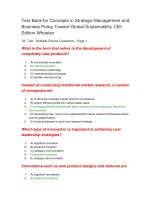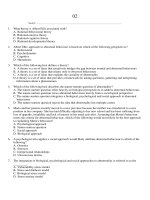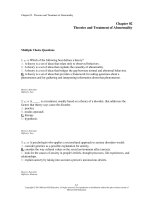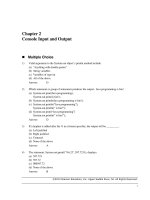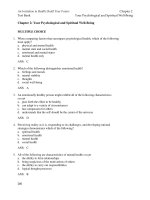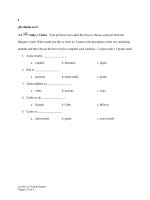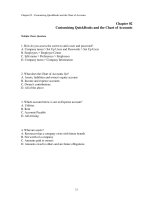Global economics 13th edition robert carbaugh test bank
Bạn đang xem bản rút gọn của tài liệu. Xem và tải ngay bản đầy đủ của tài liệu tại đây (385.43 KB, 25 trang )
������������������������������������������������������������������������������������������������������������������������������������������������������������������������������������������������������������������������������������������������������������������������������������������������������������������������������������������������������������������������������������������������������������������������������������������������������������������������������������������������������������������������������������������������������������������������������������������������������������������������������������������������������������������������������������������������������������������������������������������������������������������������������������������������������������������������������������������������������������������������������������������������������������������������������������������������������������������������������������������������������������������������������������������������������������������������������������������������������������������������������������������������������������������������������������������������������������������������������������������������������������������������������������������������������������������������������������������������������������������������������������������������������������������������������������������������������������������������������������������������������������������������������������������������������������������������������������������������������������������������������������������������������������������������������������������������������������������������������������������������������������������������������������������������������������������������������������������������������������������������������������������������������������������������������������������������������������������������������������������������������������������������������������������������������������������������������������������������������������������������������������������������������������������������������������������������������������������������������������������������������������������������������������������������������������������������������������������������������������������������������������������������������������������������������������������������������������������������������������������������������������������������������������������������������������������������������������������������������������������������������������������������������������������������������������������������������������������������������������������������������������������������������������������������������������������������������������������������������������������������������������������������������������������������������������������������������������������������������������������������������������������������������������������������������������������������������������������������������������������������������������������������������������������������������������������������������������������������������������������������������������������������������������������������������������������������������������������������������������������������������������������������������������������������������������������������������������������������������������������������������������������������������������������������������������������������������������������������������������������������������������������������������������������������������������������������������������������������������������������������������������������������������������������������������������������������������������������������������������������������������������������������������������������������������������������������������������������������������������������������������������������������������������������������������������������������������������������������������������������������������������������������������������������������������������������������������������������������������������������������������������������������������������������������������������������������������������������������������������������������������������������������������������������������������������������������������������������������������������������������������������������������������������������������������������������������������������������������������������������������������������������������������������������������������������������������������������������������������������������������������������������������������������������������������������������������������������������������������������������������������������������������������������������������������������������������������������������������������������������������������������������������������������������������������������������������������������������������������������������������������������������������������������������������������������������������������������������������������������������������������������������������������������������������������������������������������������������������������������������������������������������������������������������������������������������������������������������������������������������������������������������������������������������������������������������������������������������������������������������������������������������������������������������������������������������������������������������������������������������������������������������������������������������������������������������������������������������������������������������������������������������������������������������������������������������������������������������������������������������������������������������������������������������������������������������������������������������������������������������������������������������������������������������������������������������������������������������������������������������������������������������������������������������������������������������������������������������������������������������������������������������������������������������������������������������������������������������������������������������������������������������������������������������������������������������������������������������������������������������������������������������������������������������������������������������������������������������������������������������������������������������������������������������������������������������������������������������������������������������������������������������������������������������������������������������������������������������������������������������������������������������������������������������������������������������������������������������������������������������������������������������������������������������������������������������������������������������������������������������������������������������������������������������������������������������������������������������������������������������������������������������������������������������������������������������������������������������������������������������������������������������������������������������������������������������������������������������������������������������������������������������������������������������������������������������������������������������������������������������������������������������������������������������������������������������������������������������������������������������������������������������������������������������������������������������������������������������������������������������������������������������������������������������������������������������������������������������������������������������������������������������������������������������������������������������������������������������������������������������������������������������������������������������������������������������������������������������������������������������������������������������������������������������������������������������������������������������������������������������������������������������������������������������������������������������������������������������������������������������������������������������������������������������������������������������������������������������������������������������������������������������������������������������������������������������������������������������������������������������������������������������������������������������������������������������������������������������������������������������������������������������������������������������������������������������������������������������������������������������������������������������������������������������������������������������������������������������������������������������������������������������������������������������������������������������������������������������������������������������������������������������������������������������������������������������������������������������������������������������������������������������������������������������������������������������������������������������������������������������������������������������������������������������������������������������������������������������������������������������������������������������������������������������������������������������������������������������������������������������������������������������������������������������������������������������������������������������������������������������������������������������������������������������������������������������������������������������������������������������������������������������������������������������������������������������������������������������������������������������������������������������������������������������������������������������������������������������������������������������������������������������������������������������������������������������������������������������������������������������������������������������������������������������������������������������������������������������������������������������������������������������������������������������������������������������������������������������������������������������������������������������������������������������������������������������������������������������������������������������������������������������������������������������������������������������������������������������������������������������������������������������������������������������������������������������������������������������������������������������������������������������������������������������������������������������������������������������������������������������������������������������������������������������������������������������������������������������������������������������������������������������������������������������������������������������������������������������������������������������������������������������������������������������������������������������������������������������������������������������������������������������������������������������������������������������������������������������������������������������������������������������������������������������������������������������������������������������������������������������������������������������������������������������������������������������������������������������������������������������������������������������������������������������������������������������������������������������������������������������������������������������������������������������������������������������������������������������������������������������������������������������������������������������������������������������������������������������������������������������������������������������������������������������������������������������������������������������������������������������������������������������������������������������������������������������������������������������������������������������������������������������������������������������������������������������������������������������������������������������������������������������������������������������������������������������������������������������������������������������������������������������������������������������������������������������������������������������������������������������������������������������������������������������������������������������������������������������������������������������������������������������������������������������������������������������������������������������������������������������������������������������������������������������������������������������������������������������������������������������������������������������������������������������������������������������������������������������������������������������������������������������������������������������������������������������������������������������������������������������������������������������������������������������������������������������������������������������������������������������������������������������������������������������������������������������������������������������������������������������������������������������������������������������������������������������������������������������������������������������������������������������������������������������������������������������������������������������������������������������������������������������������������������������������������������������������������������������������������������������������������������������������������������������������������������������������������������������������������������������������������������������������������������������������������������������������������������������������������������������������������������������������������������������������������������������������������������������������������������������������������������������������������������������������������������������������������������������������������������������������������������������������������������������������������������������������������������������������������������������������������������������������������������������������������������������������������������������������������������������������������������������������������������������������������������������������������������������������������������������������������������������������������������������������������������������������������������������������������������������������������������������������������������������������������������������������������������������������������������������������������������������������������������������������������������������������������������������������������������������������������������������������������������������������������������������������������������������������������������������������������������������������������������������������������������������������������������������������������������������������������������������������������������������������������������������������������������������������������������������������������������������������������������������������������������������������������������������������������������������������������������������������������������������������������������������������������������������������������������������������������������������������������������������������������������������������������������������������������������������������������������������������������������������������������������������������������������������������������������������������������������������������������������������������������������������������������������������������������������������������������������������������������������������������������������������������������������������������������������������������������������������������������������������������������������������������������������������������������������������������������������������������������������������������������������������������������������������������������������������������������������������������������������������������������������������������������������������������������������������������������������������������������������������������������������������������������������������������������������������������������������������������������������������������������������������������������������������������������������������������������������������������������������������������������������������������������������������������������������������������������������������������������������������������������������������������������������������������������������������������������������������������������������������������������������������������������������������������������������������������������������������������������������������������������������������������������������������������������������������������������������������������������������������������������������������������������������������������������������������������������������������������������������������������������������������������������������������������������������������������������������������������������������������������������������������������������������������������������������������������������������������������������������������������������������������������������������������������������������������������������������������������������������������������������������������������������������������������������������������������������������������������������������������������������������������������������������������������������������������������������������������������������������������������������������������������������������������������������������������������������������������������������������������������������������������������������������������������������������������������������������������������������������������������������������������������������������������������������������������������������������������������������������������������������������������������������������������������������������������������������������������������������������������������������������������������������������������������������������������������������������������������������������������������������������������������������������������������������������������������������������������������������������������������������������������������������������������������������������������������������������������������������������������������������������������������������������������������������������������������������������������������������������������������������������������������������������������������������������������������������������������������������������������������������������������������������������������������������������������������������������������������������������������������������������������������������������������������������������������������������������������������������������������������������������������������������������������������������������������������������������������������������������������������������������������������������������������������������������������������������������������������������������������������������������������������������������������������������������������������������������������������������������������������������������������������������������������������������������������������������������������������������������������������������������������������������������������������������������������������������������������������������������������������������������������������������������������������������������������������������������������������������������������������������������������������������������������������������������������������������������������������������������������������������������������������������������������������������������������������������������������������������������������������������������������������������������������������������������������������������������������������������������������������������������������������������������������������������������������������������������������������������������������������������������������������������������������������������������������������������������������������������������������������������������������������������������������������������������������������������������������������������������������������������������������������������������������������������������������������������������������������������������������������������������������������������������������������������������������������������������������������������������������������������������������������������������������������������������������������������������������������������������������������������������������������������������������������������������������������������������������������������������������������������������������������������������������������������������������������������������������������������������������������������������������������������������������������������������������������������������������������������������������������������������������������������������������������������������������������������������������������������������������������������������������������������������������������������������������������������������������������������������������������������������������������������������������������������������������������������������������������������������������������������������������������������������������������������������������������������������������������������������������������������������������������������������������������������������������������������������������������������������������������������������������������������������������������������������������������������������������������������������������������������������������������������������������������������������������������������������������������������������������������������������������������������������������������������������������������������������������������������������������������������������������������������������������������������������������������������������������������������������������������������������������������������������������������������������������������������������������������������������������������������������������������������������������������������������������������������������������������������������������������������������������������������������������������������������������������������������������������������������������������������������������������������������������������������������������������������������������������������������������������������������������������������������������������������������������������������������������������������������������������������������������������������������������������������������������������������������������������������������������������������������������������������������������������������������������������������������������������������������������������������������������������������������������������������������������������������������������������������������������������������������������������������������������������������������������������������������������������������������������������������������������������������������������������������������������������������������������������������������������������������������������������������������������������������������������������������������������������������������������������������������������������������������������������������������������������������������������������������������������������������������������������������������������������������������������������������������������������������������������������������������������������������������������������������������������������������������������������������������������������������������������������������������������������������������������������������������������������������������������������������������������������������������������������������������������������������������������������������������������������������������������������������������������������������������������������������������������������������������������������������������������������������������������������������������������������������������������������������������������������������������������������������������������������������������������������������������������������������������������������������������������������������������������������������������������������������������������������������������������������������������������������������������������������������������������������������������������������������������������������������������������������������������������������������������������������������������������������������������������������������������������������������������������������������������������������������������������������������������������������������������������������������������������������������������������������������������������������������������������������������������������������������������������������������������������������������������������������������������������������������������������������������������������������������������������������������������������������������������������������������������������������������������������������������������������������������������������������������������������������������������������������������������������������������������������������������������������������������������������������������������������������������������������������������������������������������������������������������������������������������������������������������������������������������������������������������������������������������������������������������������������������������������������������������������������������������������������������������������������������������������������������������������������������������������������������������������������������������������������������������������������������������������������������������������������������������������������������������������������������������������������������������������������������������������������������������������������������������������������������������������������������������������������������������������������������������������������������������������������������������������������������������������������������������������������������������������������������������������������������������������������������������������������������������������������������������������������������������������������������������������������������������������������������������������������������������������������������������������������������������������������������������������������������������������������������������������������������������������������������������������������������������������������������������������������������������������������������������������������������������������������������������������������������������������������������������������������������������������������������������������������������������������������������������������������������������������������������������������������������������������������������������������������������������������������������������������������������������������������������������������������������������������������������������������������������������������������������������������������������������������������������������������������������������������������������������������������������������������������������������������������������������������������������������������������������������������������������������������������������������������������������������������������������������������������������������������������������������������������������������������������������������������������������������������������������������������������������������������������������������������������������������������������������������������������������������������������������������������������������������������������������������������������������������������������������������������������������������������������������������������������������������������������������������������������������������������������������������������������������������������������������������������������������������������������������������������������������������������������������������������������������������������������������������������������������������������������������������������������������������������������������������������������������������������������������������������������������������������������������������������������������������������������������������������������������������������������������������������������������������������������������������������������������������������������������������������������������������������������������������������������������������������������������������������������������������������������������������������������������������������������������������������������������������������������������������������������������������������������������������������������������������������������������������������������������������������������������������������������������������������������������������������������������������������������������������������������������������������������������������������������������������������������������������������������������������������������������������������������������������������������������������������������������������������������������������������������������������������������������������������������������������������������������������������������������������������������������������������������������������������������������������������������������������������������������������������������������������������������������������������������������������������������������������������������������������������������������������������������������������������������������������������������������������������������������������������������������������������������������������������������������������������������������������������������������������������������������������������������������������������������������������������������������������������������������������������������������������������������������������������������������������������������������������������������������������������������������������������������������������������������������������������������������������������������������������������������������������������������������������������������������������������������������������������������������������������������������������������������������������������������������������������������������������������������������������������������������������������������������������������������������������������������������������������������������������������������������������������������������������������������������������������������������������������������������������������������������������������������������������������������������������������������������������������������������������������������������������������������������������������������������������������������������������������������������������������������������������������������������������������������������������������������������������������������������������������������������������������������������������������������������������������������������������������������������������������������������������������������������������������������������������������������������������������������������������������������������������������������������������������������������������������������������������������������������������������������������������������������������������������������������������������������������������������������������������������������������������������������������������������������������������������������������������������������������������������������������������������������������������������������������������������������������������������������������������������������������������������������������������������������������������������������������������������������������������������������������������������������������������������������������������������������������������������������������������������������������������������������������������������������������������������������������������������������������������������������������������������������������������������������������������������������������������������������������������������������������������������������������������������������������������������������������������������������������������������������������������������������������������������������������������������������������������������������������������������������������������������������������������������������������������������������������������������������������������������������������������������������������������������������������������������������������������������������������������������������������������������������������������������������������������������������������������������������������������������������������������������������������������������������������������������������������������������������������������������������������������������������������������������������������������������������������������������������������������������������������������������������������������������������������������������������������������������������������������������������������������������������������������������������������������������������������������������������������������������������������������������������������������������������������������������������������������������������������������������������������������������������������������������������������������������������������������������������������������������������������������������������������������������������������������������������������������������������������������������������������������������������������������������������������������������������������������������������������������������������������������������������������������������������������������������������������������������������������������������������������������������������������������������������������������������������������������������������������������������������������������������������������������������������������������������������������������������������������������������������������������������������������������������������������������������������������������������������������������������������������������������������������������������������������������������������������������������������������������������������������������������������������������������������������������������������������������������������������������������������������������������������������������������������������������������������������������������������������������������������������������������������������������������������������������������������������������������������������������������������������������������������������������������������������������������������������������������������������������������������������������������������������������������������������������������������������������������������������������������������������������������������������������������������������������������������������������������������������������������������������������������������������������������������������������������������������������������������������������������������������������������������������������������������������������������������������������������������������������������������������������������������������������������������������������������������������������������������������������������������������������������������������������������������������������������������������������������������������������������������������������������������������������������������������������������������������������������������������������������������������������������������������������������������������������������������������������������������������������������������������������������������������������������������������������������������������������������������������������������������������������������������������������������������������������������������������������������������������������������������������������������������������������������������������������������������������������������������������������������������������������������������������������������������������������������������������������������������������������������������������tively high, U.S. exports to the world should be lower than U.K. exports to
the world, after adjusting for wage differentials.
ANS: F
PTS: 1
© 2011 Cengage Learning. All Rights Reserved. This edition is intended for use outside of the U.S. only, with content that may be different
from the U.S. Edition. May not be scanned, copied, duplicated, or posted to a publicly accessible website, in whole or in part.
30. The basic idea of mercantilism was that wealth consisted of the goods and services produced by a
nation.
ANS: F
PTS: 1
31. According to Adam Smith, international trade was a "win-win" situation since all nations could enjoy
gains from trade.
ANS: T
PTS: 1
32. The price-specie-flow mechanism illustrated why one nation's gains from trade were accompanied by
another country's losses.
ANS: F
PTS: 1
33. Complete specialization usually occurs under the assumption of increasing opportunity costs.
ANS: F
PTS: 1
34. Adam Smith contended that gold, silver, and other precious metals constituted the wealth of a nation.
ANS: F
PTS: 1
35. The price-specie-flow mechanism illustrated why nations could not maintain trade surpluses or trade
deficits over the long run.
ANS: T
PTS: 1
36. The marginal rate of transformation equals the absolute slope of a country's production possibilities
schedule.
ANS: T
PTS: 1
37. Assume that Germany has higher labor productivity and higher wage levels than France. Germany can
produce a commodity more cheaply than France if its productivity differential more than offsets its
wage differential.
ANS: T
PTS: 1
38. Ricardo's theory of comparative advantage does not take into account demand conditions when
determining relative commodity prices.
ANS: T
PTS: 1
39. If Canada has a higher wage level and higher labor productivity than Mexico, Canada will necessarily
produce a good at a higher labor cost than Mexico.
ANS: F
PTS: 1
© 2011 Cengage Learning. All Rights Reserved. This edition is intended for use outside of the U.S. only, with content that may be different
from the U.S. Edition. May not be scanned, copied, duplicated, or posted to a publicly accessible website, in whole or in part.
40. If Argentina has a comparative advantage over Brazil in beef relative to coffee, Argentina will
specialize in beef production.
ANS: T
PTS: 1
41. Modern trade theory recognizes that the pattern of world trade is governed by both demand conditions
and supply conditions.
ANS: T
PTS: 1
42. A nation achieves autarky equilibrium at the point where its community indifference curve is tangent
to its production possibilities schedule.
ANS: T
PTS: 1
43. In autarky equilibrium, a nation realizes the lowest possible level of satisfaction given the constraint of
its production possibilities schedule.
ANS: F
PTS: 1
44. A nation benefits from international trade if it can achieve a higher indifference curve than it can in
autarky.
ANS: T
PTS: 1
45. A nation realizes maximum gains from trade at the point where the international terms-of-trade line is
tangent to its community indifference curve.
ANS: T
PTS: 1
46. The Ricardian theory of comparative advantage could fully explain the distribution of the gains from
trade among trading partners.
ANS: F
PTS: 1
47. Because the Ricardian theory of comparative advantage was based only on a nation's demand
conditions, it could not fully explain the distribution of the gains from trade among trading partners.
ANS: F
PTS: 1
48. Because the Ricardian theory of comparative advantage was based only on a nation's supply
conditions, it could only determine the outer limits within which the equilibrium terms of trade would
lie.
ANS: T
PTS: 1
49. The domestic cost ratios of nations set the outer limits to the equilibrium terms of trade.
ANS: T
PTS: 1
© 2011 Cengage Learning. All Rights Reserved. This edition is intended for use outside of the U.S. only, with content that may be different
from the U.S. Edition. May not be scanned, copied, duplicated, or posted to a publicly accessible website, in whole or in part.
50. Mutually beneficial trade for two countries occurs if the equilibrium terms of trade lies between the
two countries' domestic cost ratios.
ANS: T
PTS: 1
51. Assume that the United States and Canada engage in trade. If the international terms of trade coincides
with the U.S. cost ratio, the United States realizes all of the gains from trade with Canada.
ANS: F
PTS: 1
52. Assume that the United States and Canada engage in trade. If the international terms of trade coincides
with the Canadian cost ratio, the United States realizes all of the gains from trade with Canada.
ANS: T
PTS: 1
53. If the international terms of trade lies beneath (inside) the Mexican cost ratio, Mexico is worse off with
trade than without trade.
ANS: T
PTS: 1
54. Although J. S. Mill recognized that the region of mutually beneficial trade is bounded by the cost
ratios of two countries, it was not until David Ricardo developed the theory of reciprocal demand that
the equilibrium terms of trade could be determined.
ANS: F
PTS: 1
55. According to J. S. Mill, if we know the domestic demand expressed by both trading partners for both
products, the equilibrium terms of trade can be defined.
ANS: T
PTS: 1
56. The theory of reciprocal demand asserts that as the U.S. demand for Canadian wheat rises, the
equilibrium terms of trade improve for the United States.
ANS: F
PTS: 1
57. Assume that Canada has a comparative advantage in wheat and a comparative disadvantage in autos.
As the Canadian demand for wheat increases, Canada's equilibrium terms of trade improves.
ANS: F
PTS: 1
58. The theory of reciprocal demand best applies when two countries are of equal economic size, so that
the demand conditions of each nation have a noticeable impact on market prices.
ANS: T
PTS: 1
59. The theory of reciprocal demand best applies when one country has a "large" economy and the other
country has a "small" economy.
ANS: F
PTS: 1
© 2011 Cengage Learning. All Rights Reserved. This edition is intended for use outside of the U.S. only, with content that may be different
from the U.S. Edition. May not be scanned, copied, duplicated, or posted to a publicly accessible website, in whole or in part.
60. If two nations of approximately the same size and with similar taste patterns participate in international
trade, the gains from trade tend to be shared about equally between them.
ANS: T
PTS: 1
61. The expression "importance of being unimportant" suggests that if one nation is much larger than the
other, the larger nation realizes most of the gains from trade while the smaller nation realizes fewer
gains from trade.
ANS: F
PTS: 1
62. An improvement in a nation's terms of trade occurs if the prices of its exports rise relative to the prices
of its imports over a given time period.
ANS: T
PTS: 1
63. If a country's terms of trade worsen, it must exchange fewer exports for a given amount of imports.
ANS: F
PTS: 1
64. If a country's terms of trade improve, it must exchange more exports for a given amount of imports.
ANS: F
PTS: 1
65. The terms of trade represents the rate of exchange between a country's exports and imports.
ANS: T
PTS: 1
66. Assume 1990 to be the base year. If by the end of 2004 a country's export price index rose from 100 to
130 while its import price index rose from 100 to 115, its terms of trade would equal 113.
ANS: T
PTS: 1
67. Assume 1990 to be the base year. If by the end of 2004 a country's export price index rose from 100 to
140 while its import price index rose from 100 to 160, its terms of trade would equal 120.
ANS: F
PTS: 1
68. Assume 1990 to be the base year. If by the end of 2004 a country's export price index rose from 100 to
125 while its import price index rose from 100 to 125, its terms of trade would equal 100.
ANS: T
PTS: 1
69. The commodity terms of trade are found by dividing a country's import price index by its export price
index.
ANS: F
PTS: 1
70. For the commodity terms of trade to improve, a country's export price index must rise relative to its
import price index over a given time period.
ANS: T
PTS: 1
© 2011 Cengage Learning. All Rights Reserved. This edition is intended for use outside of the U.S. only, with content that may be different
from the U.S. Edition. May not be scanned, copied, duplicated, or posted to a publicly accessible website, in whole or in part.
71. For the commodity terms of trade to improve, a country's import price index must rise relative to its
export price index over a given time period.
ANS: F
PTS: 1
SHORT ANSWER
1. Is it possible to add up the preferences of all consumers in an entire nation?
ANS:
No. It is impossible to make interpersonal comparisons of satisfaction, and thus it is not possible to add
up preferences.
PTS: 1
2. Who gains more from trade, when nations are of unequal economic size?
ANS:
If one nation is significantly larger than the other, the larger nation attains fewer gains from trade,
while the smaller nation captures most of the gains from trade.
PTS: 1
3. Is it possible for comparative advantage to change, thus changing the direction of trade?
ANS:
Lagging productivity growth may cause a country to lose its comparative advantage. In a two-product,
two-country model, this would change the direction of trade.
PTS: 1
4. Do national security concerns lead to incomplete specialization?
ANS:
Yes. National security concerns may lead a country to produce some of the commodity in which it has
comparative disadvantage, thus leading to incomplete specialization.
PTS: 1
© 2011 Cengage Learning. All Rights Reserved. This edition is intended for use outside of the U.S. only, with content that may be different
from the U.S. Edition. May not be scanned, copied, duplicated, or posted to a publicly accessible website, in whole or in part.
ESSAY
1. Will it be impossible to keep low-skilled jobs in the U.S.?
ANS:
If tax credits or other incentives are made available to U.S. companies, it would be possible for those
companies to invest in training or technology for low-skilled workers. That would improve the
efficiency of the workers. Such improvements in productivity can more than outweigh the wage
advantage that is enjoyed by low-skilled workers overseas. New Balance Athletic Shoe Co. Inc.,
headquartered in Boston, Massachusetts, has been successful in retaining low-skilled production in the
United States by increasing worker productivity.
PTS: 1
2. Is it possible to estimate the gains from trade?
ANS:
When a nation trades, it enjoys a larger income, owing to a wider range of goods available to
consumers. Trade also has a positive influence on productivity levels. However, it is extremely
difficult to measure these gains, since it requires knowledge of what a nation's imports would cost if it
produced them itself, instead of purchasing them from a less expensive source abroad.
PTS: 1
© 2011 Cengage Learning. All Rights Reserved. This edition is intended for use outside of the U.S. only, with content that may be different
from the U.S. Edition. May not be scanned, copied, duplicated, or posted to a publicly accessible website, in whole or in part.


